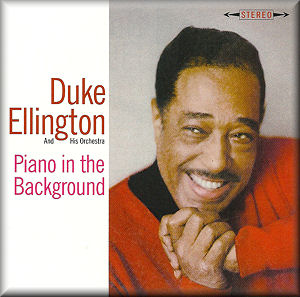1. Happy Go Lucky Local
2. What Am I Here For?
3. Kinda Dukish/Rockin' in Rhythm
4. Perdido
5. I'm Beginning to See the Light
6. Mid-Riff
7. It Don't Mean a Thing (If It Ain't Got That Swing)
8. Main Stem
9. Take The "A" Train
10. Lullaby of Birdland
11. The Wailer
12. Dreamy Sort of Thing
13. Lullaby of Birdland (Version 2
14. Misfit Blues (Suite Thursday Part I)
15. Schwiphti (Suite Thursday Part II)
16. Zweet Zurzday (Suite Thursday Part III)
17. Lay-By (Suite Thursday Part IV)
Duke Ellington - Piano (tracks 1, 2, 4-6, 8, 9, 11, 14-17)
Willie Cook, Eddie Mullens, Andrew Merenghito (Fats Ford) - Trumpets
Ray Nance - Trumpet, violin
Gerald Wilson - Trumpet (tracks 1, 11)
Booty Wood, Lawrence Brown - Trombones
Britt Woodman - Trombone (tracks 1-13)
Mathew Gee - Trombone (tracks 14-17)
Jimmy Hamilton - Clarinet, tenor sax
Russell Procope - Alto sax, clarinet
Johnny Hodges - Alto sax (tracks 1-13)
Paul Gonsalves - Tenor sax
Harry Carney - Baritone sax, bass clarinet
Juan Tizol - Valve trombone (tracks 3-5, 7, 8, 10, 12-17)
Paul Horn - Alto sax (tracks 14-17)
Billy Strayhorn - Piano (tracks 3, 7, 10, 12, 13)
Aaron Bell - Bass
Sam Woodyard - Drums
The title of this 1960 album may have been designed as a contrast to the following year's Piano in the Foreground, which comprised Duke Ellington playing simply with bass and drums. But his piano is certainly not in the background on this album with his whole orchestra, here reissued with bonus tracks. In fact Duke introduces most numbers from the piano and concludes them as well. Ellington's piano is often prominent - and integral to the music both with its solos and interpolations. The Duke actually opens Kinda Dukish, Take the "A" Train and Lullaby of Birdland with long piano solos.
The original LP (tracks 1-9) reworked some of Ellington's best-known tunes with imaginative new arrangements. Happy Go Lucky Local is a realistic portrayal of a train puffing and squeaking: one of Duke's many compositions about trains, where he wrote much of his material.
The catchy What Am I Here For? has a marvellous ensemble sound.
Kinda Dukish had become the traditional intro to Rockin'
in Rhythm and Ellington plays it lustily. Perdido is transformed
by a counter-melody created by Jimmy Hamilton and Clark Terry so as
to be almost unrecognisable. Jimmy Hamilton's crystal-clear clarinet
soars above the orchestra. Duke's piano naughtily suggests Chopsticks.
I'm Beginning to See the Light (apparently arranged by Bill Mathieu) is taken at breakneck speed, yet the saxophones manage to play in perfectly co-ordinated harmony on the second chorus. On several tracks, Billy Strayhorn takes over at the piano. His style might easily be mistaken for Duke's. He opens It Don't Mean a Thing with minimal piano, almost like Count Basie. Then the trumpet comes in cheekily playing Lulu's Back in Town.
I don't think tracks 10 to 13 were included on the original LP but they are well worth hearing. Gerald Wilson's The Wailer includes a gorgeously serpentine tenor solo from Paul Gonsalves, and it is interesting to hear Ellington's two differing takes on George Shearing's Lullaby of Birdland. Dreamy Sort of Thing describes exactly a visionary feature for Johnny Hodges' dreamy alto.
The last four bonus tracks comprise Suite Thursday, co-written by Ellington and Billy Strayhorn, and inspired by John Steinbeck's novel Sweet Thursday. Misfit Blues is pleasurably relaxed; Schwiphti is energetic and characterful; Zweet Zurzday portrays the fishery activity and atmosphere; and Lay-By emphasises the two-note device which has served as a leitmotif throughout the suite. Ray Nance's violin is particularly effective in this last movement.
Some other reissues of this album inexplicably include a version of Harlem Air Shaft, which is not here. Perhaps unwisely, this reissue reprints in the sleeve-note John S. Wilson's original review of the album from Down Beat, where he unfairly criticizes Sam Woodyard's drumming (throwing in an insult at Sonny Payne) and points out numerous flaws in the recording. Fortunately the remastering has brought the sound up fresh and clear. In fact this is the first album I would advise you to "play it loud" to get the full stunning effect of the majestic music.
Tony Augarde
www.augardebooks.co.uk
